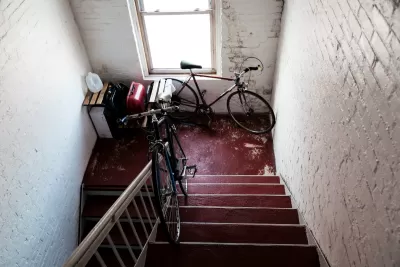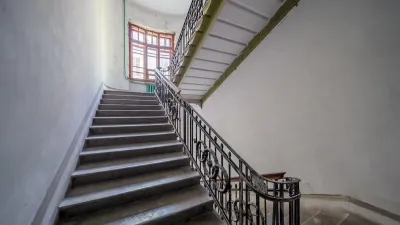The movement to legalize single-stair multi-story buildings is gathering momentum, with the typology offering a more efficient, flexible, and healthy way to build housing.

According to Julian Frost, writing in Greater Greater Washington, “The movement for single-stair reform may be reaching a critical mass of momentum and support in the US.”
Frost assesses the bills proposed in the D.C. region and how they might advance in 2025. In Frost’s view, “Single-stair reform would make small-lot infill development more feasible, and allow for generous, flexible, and well-ventilated apartment layouts.”
However, many global cities safely use single-stair buildings, which save space and make different layouts possible. “The legalization of six-story single-stair buildings would bring into play small infill lots that are currently infeasible to develop due to the geometrical constraints of the double-egress rule.” Single-stair buildings make it possible to give apartments windows on both sides of a unit, improving the health and mental well-being of residents.
The typology isn’t entirely absent in the United States, Frost notes, pointing out examples in Seattle and Brooklyn. But most U.S. building codes have called for multiple stairwells in taller multifamily buildings for decades, citing safety concerns. Now, bills to legalize single-stair buildings are being introduced at both local and state levels in dozens of jurisdictions including Maryland.
FULL STORY: How single-stair apartment reforms could advance across the region this year

Trump Administration Could Effectively End Housing Voucher Program
Federal officials are eyeing major cuts to the Section 8 program that helps millions of low-income households pay rent.

Planetizen Federal Action Tracker
A weekly monitor of how Trump’s orders and actions are impacting planners and planning in America.

Ken Jennings Launches Transit Web Series
The Jeopardy champ wants you to ride public transit.

Washington Legislature Passes Rent Increase Cap
A bill that caps rent increases at 7 percent plus inflation is headed to the governor’s desk.

From Planning to Action: How LA County Is Rethinking Climate Resilience
Chief Sustainability Officer Rita Kampalath outlines the County’s shift from planning to implementation in its climate resilience efforts, emphasizing cross-departmental coordination, updated recovery strategies, and the need for flexible funding.

New Mexico Aging Department Commits to Helping Seniors Age ‘In Place’ and ‘Autonomously’ in New Draft Plan
As New Mexico’s population of seniors continues to grow, the state’s aging department is proposing expanded initiatives to help seniors maintain their autonomy while also supporting family caregivers.
Urban Design for Planners 1: Software Tools
This six-course series explores essential urban design concepts using open source software and equips planners with the tools they need to participate fully in the urban design process.
Planning for Universal Design
Learn the tools for implementing Universal Design in planning regulations.
Heyer Gruel & Associates PA
Ada County Highway District
Institute for Housing and Urban Development Studies (IHS)
City of Grandview
Harvard GSD Executive Education
Toledo-Lucas County Plan Commissions
Salt Lake City
NYU Wagner Graduate School of Public Service





























